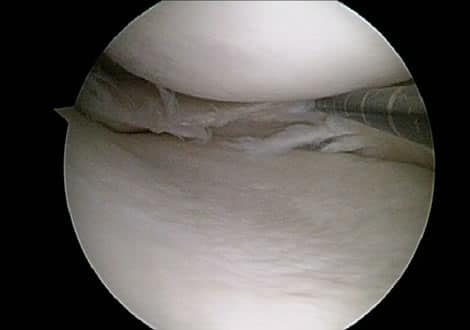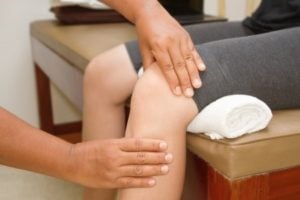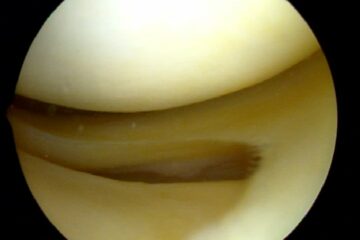
Runners often develop knee pain. Some make the mistake of rushing for an MRI of the knee too soon. If given enough time, cross-training, and physical therapy your knee pain will often subside. Degenerative “posterior horn meniscus tears” are very common in runners. Most runners will not need knee meniscus surgery… and most runners will be able to return to running. As a matter of fact, meniscus surgery in some runners might end their running career.
When a runner sees an Orthopedic Surgeon they may be referred for an MRI. Keep in mind. Virtually no one over 40 has a “normal” knee MRI. Upwards of 30-35% of runners over 50 have meniscus tears. Does a runner have to stop running because of a meniscus tear?

Runners are often inclined to jump for surgical options thinking they might be able to get back to running sooner. That might be the wrong decision.
That’s not the best strategy if you wish to continue running for years to come. As we discussed earlier in this blog, having a portion of your meniscus taken out can predispose you to develop arthritis of the knee. For every runner who might have done well following an arthroscopy, there are one or two who never went back to running. The key, as we will discuss is patience, and not making quick emotional decisions about how to treat your meniscus tear if you are an active runner.
So an MRI of a runner’s knee with pain might show a meniscus tear. Does that mean that the meniscus is the cause of pain? Does that mean that the runner needs surgery? Can they continue running?
Running is a great exercise. Runners are a unique breed of athlete to treat. Running is meditative and enables us to relax, as we hit our goal of exercising a few days per week. If we cannot run because of a meniscus tear or knee pain we will be very upset. As you can imagine this blog receives hundreds of private comments each month. The following questions appeared three times recently in slightly different formats… The questions centered around running and meniscus tears.
Most common questions from runners with a meniscus tear:
- Can I continue to run with a meniscus tear?
- Can I make a meniscus tear worse if I run?
- Will meniscus surgery help me run better?
As you know, we have two menisci in each knee, we discuss what a meniscus is here. Most meniscus tears, especially in runners tend to occur along the posterior horn of the medial meniscus. These tears tend to be degenerative tears, possibly (but not proven to be) associated with a long running career.
Runners and meniscus tears:
Meniscus tears can present in two different ways in runners. Whether or not you can run depends on which group you are in.
Group 1: Most runners find out that they have a medial meniscus tear because they go to an Orthopedic Surgeon’s office when their knee hurts after a run. Most runners do not recall any one particular injury- that’s why we call these degenerative meniscus tears.
This group of runners with a meniscus tear is often able to run. They have varying amounts of pain after the run, or during the run, especially if they run on a cantered road or a trail.
This group is most concerned with making the tear worse if they continue to run. They wonder if they can continue to run despite having a meniscus tear. Most of these runners only require a good explanation that running will not make things worse.

Group 2: Sometimes a runner presents with pain on the inner side of the knee or the back of the knee. The pain is severe enough that they cannot run, squat, pivot, or twist. These runners are concerned because they are not able to run. Because runners are so committed, and often “need to” run, they may overreact and choose the wrong treatment option.
What is causing the pain? Often times when these degenerative tears initiate or occur the knee pain will be more severe for a few weeks. Yes, a few weeks… perhaps even a month or two. The pain is usually due to synovitis (inflammation) which will often settle down over time.
Here’s how many runners get into trouble…
Runners rush into a docs office, they get an MRI, and surgery is scheduled before they give the pain a chance to improve on its own. A meniscus does not have nerves in it. The tear itself doesn’t hurt. The inflammation because of the tear and the nearby tissues the torn piece irritates. It may take 6-12 weeks or more for that inflammation from the meniscus tear to settle down.
And yes, the inflammation within the knee due to a meniscus tear in a runner can, and often does settle down without having surgery on the tear.
The research into these degenerative meniscus tears that often occur in runners has been pretty clear. The vast majority of runners are able to avoid meniscus surgery.
Having part of your meniscus removed as a runner could end a long running career. Surgery for a meniscus tear in a runner might help for a short while, but the loss of meniscus might initiate an arthritic process causing more degeneration within the knee. Runners, in general, have a lower incidence of arthritis than a non-runner — but not if part of the meniscus is removed.
Can I run with a meniscus tear?
First off… many if not most meniscus tears do not require surgery. Surgery will not prevent arthritis from occurring. On the contrary, osteoarthritis may actually worsen faster if a runner has meniscus surgery.
Many runners get back on the road, even elite runners, with a degenerative meniscus tear. If you have a mild ache during the run, or a mildly sore knee after a run then you can often continue running. There is very little risk that running will worsen the tear. Meniscus tears can always worsen… remember, this is a process of degeneration. The meniscus has been changing or wearing out for a decade.
That degenerating process won’t slow, even if you change to just walking. No one can promise you the tear will never become larger. That’s like guaranteeing you that you won’t need stronger glasses or won’t lose more hair as you age :-(.
You may wish to wear a compression sleeve during the run. Compression sleeves have been proven to improve knee pain and improve a sense of knee stability. If you run on a cantered road, perhaps change the direction you run. If you run single track trails perhaps run on carriage trails. Those little changes can make a big difference. Surgery for a meniscus tear in a runner should be considered only if:
- the pain continues beyond 3 months and is severe enough that you cannot run.
- your pain did not improve with appropriate physical therapy – yes it works.
- a compression sleeve does not improve your symptoms
- you waited at least 6-8 weeks for your knee to recover on its own.
- you have no evidence of moderate or severe osteoarthritis.
- your surgeon strongly believes that it is realistic that you could return to running after surgery.
Meniscus surgery in a runner.
If you are a runner and the pain you have from a meniscus tear is keeping you from doing what you love then there is a chance that surgery might be the right option for you. As long as you do not have confounding issues such as osteoarthritis then you might feel great after arthroscopy for your meniscus tear.
Runners with osteoarthritis and a meniscus tear are often considered a good candidate for a different procedure which I go into detail here.
But remember, there is a chance that you will not feel great after knee surgery for a meniscus tear. The decision-making variables here are key to ensure the best chance of success. Understand the principles of shared decision-making before signing the dotted line. Perhaps consider seeing an Orthopedic Surgeon who is also a runner.
Being an active trail/endurance runner gives me a much greater appreciation of just how important running is in your life!
When can I run after meniscus tear surgery?
Runners start to whither if we cannot run. I am one of you! I get it! But rushing back out onto the road is a recipe for a disaster if you return to running too soon. When a part of the meniscus is removed, the physics of how the knee works and the stress that certain parts of the knee are subject to change significantly.
You must allow for the knee to recover and get used to its new environment. That might mean returning to running at 4 weeks, or it might mean 6-8 weeks depending on the appearance of the other structures in your knee at the time of surgery. If you head back out on the road and your knee swells significantly then your knee is telling you that it is not ready.
Do your exercises and wait a few more weeks.
Plan on slowly adding your miles back. Plan on slowly adding to your pace. Do not plan on an intense interval, track or hill work for at least 3 months after meniscus surgery. Think long term… we are trying to prevent secondary damage to your knee and give you a longer running career.















I have a degenerative meniscus tear. MRI scan diagnosed this approx 7 years ago . Mainly running and martial arts training, swimming and cycling are the sports i enjoyed. I was referred to an orthopedic surgeon following the scan for arthroscopy procedure however the waiting time was approx 8 plus weks, swelling had gone down and was able to bend the knee with light jogging. kicking a pad in training was out of the question. I explained to the surgeon that my knee had improved however not 100%. His advice was, no invasive treatment for now, if it gets worse come and see me again. The last time i ran was 18 months. Before that i found that when i did run the knee would stiffen ,swell with pain. This happened on many an occasion. My preferred method of rehabilitation was always rest then swimming and cycling until i could jog again. As stated above the last run was 18 months ago , which was a steady jog with my son; however the course had an hill (perfect for hill repeats!!) i coached my son up the hill then proceeded to follow…3 times! My knee started to stiffen, with pain. That was 18 months ago…….i can now only cycle and swim but no running. I used to adjust my gait i.e running on my toes to alleviate pain. Nothing works now just so painful if i attempt to run.
I would greatly appreciate any advice.
When people have swelling we often worry about the coexistence of arthritic changes. The radiologist might call them articular cartilage signal change, chondromalacia, thinning of the articular cartilage, etc. Surprisingly, many radiologists do not use the term arthritis in their MRI reports. If there are articular cartilage changes then that might account for the swelling you experience.
As you can imagine, I am not allowed to give advice in this format. federal law forbids that. I can suggest further opinions to try and nail down what the cause of your pain and swelling is.
Howard – a great article, especially given recent BMJ consensus guidelines, and sham surgery controlled studies, suggesting partial meniscectomy for degenerative meniscal tears is not superior to physical therapy. On the question of running after a conservatively managed degenerative meniscal tear, I wondered if you’d seen the recent work led by Edward Wojtys suggesting many ACL tears are fatigue-related, with ongoing microtrauma disrupting the integrity of the collagen matrix, meaning a comparatively trivial event can trigger rupture, similar to metal fatigue. There is also recent work showing, at least in animal models, that menisci are subject to similar repetitive use fatigue, predisposing to failure. Against this, other research suggests cyclic loading can improve blood flow to knee articular cartilage, a possible mechanism by which runners keep their knee osteoarthritis incidence low.
My questions are: given most of the meniscus is avascular, is it plausible that cyclic loading fails to benefit the meniscus in the same way that it does articular cartilage? If so, should we conclude that cyclic loading to the human meniscus, via running, is likely to lead to structural fatigue and further risk of tears, without any compensating benefits? If so, shouldn’t the meniscal tear survivor avoid running? (Of course, as a runner, I’m looking for a good reason not to believe this!) Thanks in advance Howard.
Hi Paul… We just don’t know. Many runners have posterior horn medial meniscal degenerative tears… and most can run on them with little or no pain. Many non-running peers have the same tears. We are not sure if they are more common in runners.
Now… we do not have proof that running causes arthritis, either with or without a meniscus tear. A meniscus tear can predispose to OA but we do not know if that risk increases in runners.
What we do know is that many runners remain active despite meniscus tears and even moderate OA. What happens to the runner who fails to run out of fear that they might be making something worse? They may not find an activity that they enjoy as much, and may, therefore, become far less active. So, in essence, they would be increasing their risk of weight gain, metabolic syndrome, HTN, heart disease, stroke, hyperinsulinemia, and more because they are less active— all because they are afraid they might be making their arthritis progress. And we have no proof that that even happens… as you pointed out, there is literature that shows that our articular cartilage likes the cyclical loading of running- to a point. So it may actually be proven that running is somewhat protective in the end. From a personal perspective, when I look at myself as an entire being, all systems considered the benefits of running (for me) clearly outweigh any theoretical risk to my knee.
Great question… thanks for stopping by~!
Thanks Howard – I think it’s fantastic you’re taking the time to keep this blog running, and help keep the populace educated. I just dodged a partial meniscectomy after seeing a physician who took me through all the sham-controlled studies showing no benefit in level of function or quality of life after 24 months. I also saw other studies suggesting the procedure can lead to osteoarthritic changes in the operated knee as early as 12 months. Many surgeons will be persuaded that their arthroscopic surgery improves patients because, even for medicos, it’s hard to divorce oneself (I’m a former physician) from the good outcomes we produce in front of our eyes, often by a placebo effect. To have a surgeon being so clear-eyed about the results of their own trade, as you seem to be, is refreshing, healthy for the community, and engenders trust that when you do operate it’s based on objective evidence of benefit. I applaud you!
Thank you, Paul. That was very kind of you.
What a great and lucid article, thank you! Like most of the people here, running is important for my mental health and it defines who I am. After a Dr. visit and subsequent MRI about 3 weeks ago, I found out I have a quite an extensive horizontal degenerative tear on my medial meniscus at the transition of the posterior horn / body of the meniscus all the way to the the articular surface. Most (not all) of the swelling and mild pain is gone. Its actually so much better! I have full mobility and have been exercising (about everything except running). My question is, when can I get back to running? All I wish for is going for a 6-10mi run 3x a week and not have pain and swelling in my knee. BTW I am 60yrs old.
:-) Thanks Terra.
The time until you can return to running will vary a lot among different individuals. Some can return within a few weeks, some may take 6-12 months. You do not want to push the distance too far, the cadence too quickly or the pace too much during the recovery phase after you return. That can cause setbacks.
Hi Doc Howard,
Thanks for this article and I really enjoyed reading it.
I am male, 40 years old. Sept 2019, I took MRI on my left knee and report said :
1. Peripheral medial meniscal tear posterior horn
2. Insufficiency (stress) fracture medial condylus tibia.
Doctor said the meniscus torn was not so much of worry for the time being but it will become serious. While for the fracture, I must stop training (for Chicago Marathon) and might break the whole leg if I kept running. Doc told me to take another photo in one month time and see him again.
I stopped training at all but still went running the Chicago Marathon in Oct 13th (finished 6 hours), but I stopped running at all after that.
Last week, Jan 4th, I took x-ray on my knee, the fracture is gone which is good news. However, the doctor said I need to be cautious about my meniscus and it will not go away. He also said, I may need surgery to cut some of the meniscus, but need to further check by making a small hole with camera into my knee (forgot the term). In the meantime, I can continue running but need to be mindful of pain or swollen.
I went to see another doctor, he told me meniscus tear is quite common and as long as I can do activity without pain, I am fine.
As of now, I do not feel any pain and do not spot any swollen. I can straighten my leg without any pain. I can twist my knee. I joined a 10K race yesterday Jan 12th (after stopping for 3 months) and I am fine today.
Can you advise what I should be cautious of ? Do I need to have further test to ensure the seriousness of my meniscus ? What should I do and don’t ?
I am thinking to join a marathon in July and another one in Nov.
I love running, as well as other stuffs (hiking, swimming, gym), so it is not easy for me to just stop running…but I do not wish my running to cost me a knee.
Understand you may not be able to give medical advice without seeing me or my report, so I appreciate any suggestion from you.
With great thanks,
Albert.
Hi Doctor Howard,
Hi Doc Howard,
Thanks for this article and I really enjoyed reading it.
I am male, 40 years old. Sept 2019, I took MRI on my left knee and report said :
1. Peripheral medial meniscal tear posterior horn
2. Insufficiency (stress) fracture medial condylus tibia.
Doctor said the meniscus torn was not so much of worry for the time being but it will become serious. While for the fracture, I must stop training (for Chicago Marathon) and might break the whole leg if I kept running. Doc told me to take another photo in one month time and see him again.
I stopped training at all but still went running the Chicago Marathon in Oct 13th (finished 6 hours), but I stopped running at all after that.
Last week, Jan 4th, I took x-ray on my knee, the fracture is gone which is good news. However, the doctor said I need to be cautious about my meniscus and it will not go away. He also said, I may need surgery to cut some of the meniscus, but need to further check by making a small hole with camera into my knee (forgot the term). In the meantime, I can continue running but need to be mindful of pain or swollen.
I went to see another doctor, he told me meniscus tear is quite common and as long as I can do activity without pain, I am fine.
As of now, I do not feel any pain and do not spot any swollen. I can straighten my leg without any pain. I can twist my knee. I joined a 10K race yesterday Jan 12th (after stopping for 3 months) and I am fine today.
Can you advise what I should be cautious of ? Do I need to have further test to ensure the seriousness of my meniscus ? What should I do and don’t ?
I am thinking to join a marathon in July and another one in Nov.
I love running, as well as other stuffs (hiking, swimming, gym), so it is not easy for me to just stop running…but I do not wish my running to cost me a knee.
Understand you may not be able to give medical advice without seeing me or my report, so I appreciate any suggestion from you.
With great thanks,
Albert.
Reply
Hello Howard.
I am a 57 yrs old 5 foot 10 148 lbs.
A recent MRI has found
A near full thickness radial tear through the posterior root insertion of the medial meniscus.
There is a partial medial meniscal extrusion. Partial thickness fissuring of the cartilage on the deep surface of the medial femoral condyle is noted.
A small bakers cyst is noted.
Grade 3 fissuring affects the patellar cartilage centrally.
I have not run ( and still cannot run ) for 6 weeks , I have no swelling or pain , I have full motion of the knee / leg ……but the knee feels very unstable when walking .
My surgeon wants to remove a third of my meniscus, and recommends I stop running to reduce the speed of OA .
I would love to hear your thoughts on treatment
Please read the post on my site about root tears. They should be 1. repaired if they are not degenerative (sutured back to the tibia) or left alone if they are degenerative or if there is arthritis present. I would not have that piece removed. Those knees do not do well… especially in a runner.